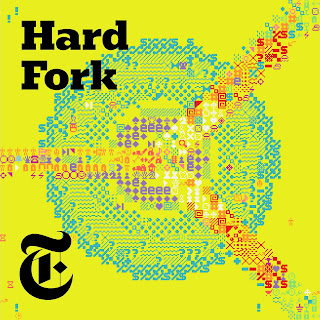Hard Fork, a new podcast from The New York Times, explores stories from the wild frontier of tech and the future that’s already here.
The marketing pitch for the show is: "With curiosity and humor, veteran tech journalists Kevin Roose and Casey Newton discuss the latest stories in the world of tech and business, bringing listeners news, interviews and analysis from the bleeding edge."
“The tech industry we’ve both covered for more than a decade is transforming into something new and strange, and this show is our way of trying to understand what’s happening and explain it to listeners,” said Roose and Newton. “It’s a smart, casual conversation that tells you where tech and business are going without overwhelming you — and might even give you some reasons for hope.”
On the inaugural episode of Hard Fork, the hosts debate why Elon Musk may buy Twitter after all. Then, they step into Meta’s metaverse with New York Times reporter, Kashmir Hill.
The full transcript of the episode is available here, with highlights below:
Casey Newton
You know, and I think it's worth saying that this is something that the Internet is good at and has always been good at, is helping people feel a little bit less alone, meeting new people, meeting new people who are like you. And that story, I think, is powerful and speaks to the fact that a lot of people probably are going to find cool new connections in here in a way that, for some of the reasons you just mentioned, maybe they would not have in a previous generation technology.
Kevin Roose
At the same time, though, [...] it does strike me as kind of dystopian that you know, we have an Internet that connects people. Anyone can talk to anyone. We have all these technologies that have enabled us to communicate at scale. And yet, the way that some people are finding connection is to go into this walled garden metaverse experience, where everything they do, everything they say, every movement they make is being tracked and logged somewhere for Meta to see, where the whole point of the thing commercially is to sell them stuff. It just feels like a really poor substitute for the real world. I mean, am I being too cynical here?
Casey Newton
I mean, the smartphone was a poor substitute for the real world. But we moved to there.
Kashmir Hill
I listened to the three-hour podcast [Mark Zuckerberg] did with Joe Rogan. And, you know, he basically said technology is getting in the way of our interactions. Like everyone's looking away, they're looking at their phone, they're looking at screens and not the people around them. So [he] decided to make the metaverse because then it'll get technology out of the way, and we'll just be immersed inside it. You know, I think all technology is kind of interrupting our ability to be with each other, and it enables good things and enables bad things. But yeah, for me personally, I don't know. [...] It does take you away from the people you're with. But if you're in a situation where you're lonely, and you don't have people around you, you don't have a support system or something to do, I guess I can see the appeal.
*****************
Sure, this is another technology podcast with two hosts discussing the weekly tech hotspots, and there are plenty of podcasts that fit that mold on podcast apps. But The Times has shown the ability to inject second-level intelligence and careful reflection into its podcasts.
We'll have to see if Hard Fork is just a light snack or a full-course meal about technology.

Comments
Post a Comment
Thank You for your input and feedback. If you requested a response, we will do so as soon as possible.